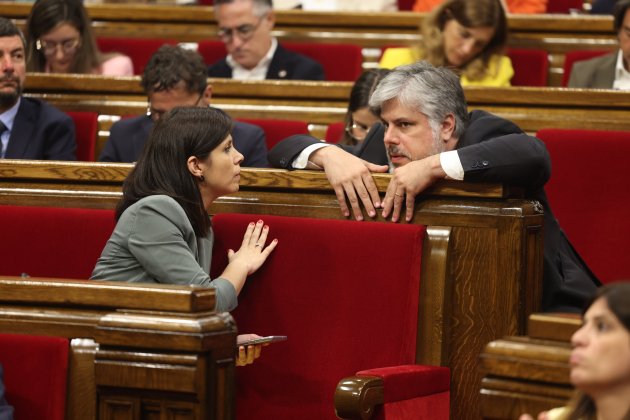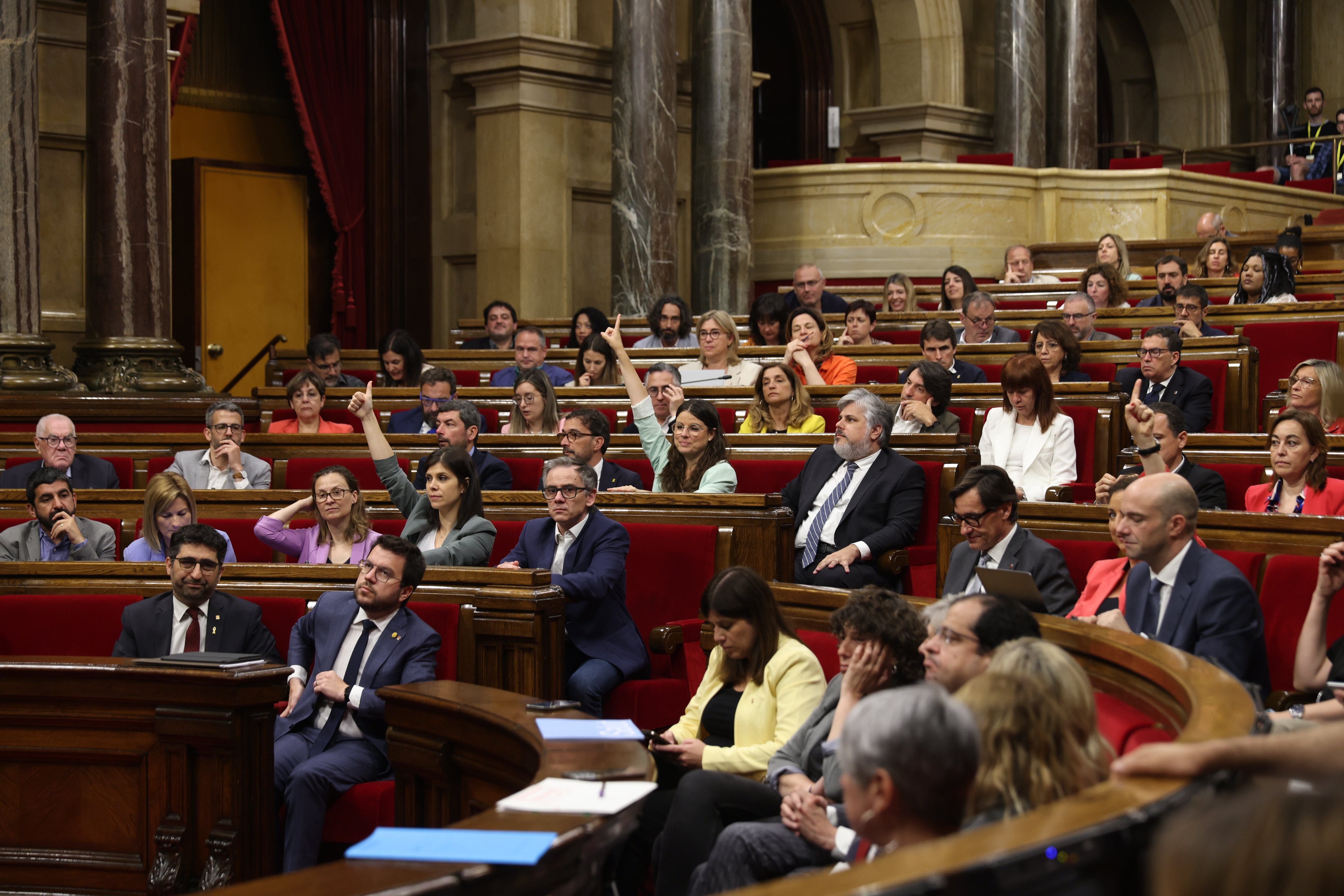After two months of fruitless attempts to find a consensus on Catalan in the classrooms in the face of the linguistic impositions of the Spanish courts, yesterday afternoon, barely a few minutes before the deadline for parliamentary registration of a proposed bill, four political parties - the PSC, ERC, Junts and the Comuns presented a new ad hoc law on language policy in schools, which establishes Catalan as the vehicular language and Spanish as the language of curricular use, with the definition of this latter phrase being a point on which the four parties do not seem to have exactly the same idea. In any case, the bill was registered, and this Wednesday at the start of the plenary session of the Catalan Parliament it has passed its first vote, after a debate in which the four parties supporting it closed ranks around the consensus and sought to vindicate their perspective on the agreement, while the pro-independence CUP and the Spanish right were upset, for very different reasons. In the end, there were no last-minute moves that affected the voting, and the legislative measure passed its first parliamentary stage with 105 votes in favour and 28 against.
Having passing this stage, a 48-hour amendment period now begins, and on Friday at noon it is expected that the text will be definitively passed. This rapid parliamentary process has come about after the parties set in motion the process for a single-reading procedure, a move of maximum urgency that will allow the new proposal to become law in this same plenary. So now the parties will present their amendments, and the main pro-Catalan group which has already proposed one is not a political party but the linguistic NGO Plataforma per la Llengua, which believes the law could open the way to an even greater imposition of Spanish language in the classrooms, up to 50%. Meanwhile, far-right Vox has announced that it will attempt to stop the rapid passage of the bill by sending it to the Council of Statutory Guarantees, the Catalan organ that ensures the constitutionality of legislation.
Defence with different nuances
The two Catalan government partners, ERC and Junts, took the opportunity to celebrate the agreement. From ERC, Marta Vilalta asserted that the measure makes it possible "to avoid judicial interferences that seek to impose percentages without any sense". "We knew that the maximum possible consensus was needed," which is why she celebrated the transversality of the pact, with only the CUP as a possible fifth partner, but which in the end stayed out of the deal. For her part, from Junts, Mònica Sales pointed out that the law preserves the Catalan immersion model after some judicial interference "that wants to put it in doubt". She also insisted that it leaves Catalan as the only vehicular language "without any other possible interpretation". "It is fundamental to have agreed that language learning will only be based on pedagogical criteria and not paying attention to the court ruling," she said, in reference to the 25% Spanish imposed by the TSJC. Meanwhile, the Socialists put the emphasis on the increased status that the new bill gives to Spanish, because it is defined as being of "curricular use". "It is an important step in recognizing and respecting a language that is not foreign and that is the language of many Catalans", said Esther Niubó.

Wake up call from the CUP
The most severe criticism came from the benches of the far-left pro-independence CUP. Dolors Sabater once again insisted that the pact only succeeds in "adapting the legislation to the 25% ruling and turning that court decision into law". "Those who are legislating are the members of the Catalan High Court, not the MPs." She also asserted that the new legislation was enshrining the "retreat" of Catalan, observing how the Socialists were celebrating that the new text meant that Spanish would become a vehicular language, and claimed that the court ruling had to be faced head on, with a response that was "intelligent" and centred on "the country". The CUP's position was to some extent echoed by the NGO Plataforma per la Llengua, whose leaders spoke to the press at Parliament and warned that, despite it being positive that the existing law on language policy has not been modified, the new text's reference to Spanish as a "curricular language" could allow the Spanish government to demand 50% of Spanish in classrooms, under Article 6 of its current education act, the so-called Celáa Law.
Vox's last-minute manouevre
From the Spanish right, Vox classified the agreement as a "swindle" that does not recognize the vehicularity of Spanish, a language already spoken 600 million people in 20 countries, as the group's spokesperson Ignacio Garriga recalled. And this Wednesday afternoon the group went even further, and announced that it will send the proposal to the Council of Statutory Guarantees, the Catalan organ that ensures the constitutionality of legislation. This is purely intended as a delaying tactic: "We are doing it with a single goal, which is to paralyze this assault on the legality and right of Catalans," said Garriga. For this intiative, Vox has successfully obtained the support of the other parties of the Spanish right, the PP and Ciudadanos. Referring the bill to the Council of Statutory Guarantees is intended to push the last-minute processing of the new language law past the May 31st deadline which the Catalan High Court has set for the introduction of its 25% Spanish language quota in classrooms.
What does the law say about Catalan?
The bill presented jointly by PSC, ERC, Junts and the Comuns on the use and learning of official languages in non-university education states that Catalan "is the language normally used as the vehicular language and language of learning in the education system and that of normal use in the reception of new students. It also includes that Spanish is used in the terms set out in the language projects of each centre. In this regard, it states that “the teaching and curricular and educational use of Catalan and Spanish must be guaranteed and have an adequate presence in curricula and in educational projects” and it added that the presence of the official languages "must take into account the general sociolinguistic situation, that of the centres and their environment, the objectives of linguistic normalization and the evolution of the language learning process."

